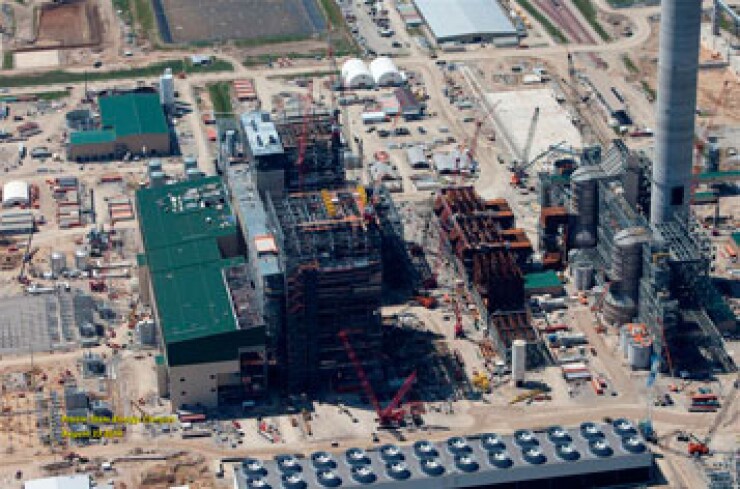
CHICAGO — A group of ratepayers from Batavia, Ill. filed suit against five advisors and consultants, accusing them of misrepresenting the value the Chicago suburb's participation in the bond-financed Prairie State Energy Campus.
"Based on current available information, our clients believe that the resulting contract is causing a substantial increase in electric rates and sales tax in Batavia," said their attorney, Michael Duffy, of Childress Duffy Ltd.
The complaint alleges negligent misrepresentation by five consultants and advisors Batavia used to assess whether to enter into a 28-year take-or-pay contract through the Northern Illinois Municipal Power Authority to purchase power from the plant.
The complaint names 19 other entities as respondents in the discovery process. Duffy said the complaint, which seeks class action status, could eventually be amended to name additional defendants.
The group of ratepayers is seeking compensation for steep energy rate hikes and other taxes they've paid beginning in 2012 due to construction delays and cost overruns that drove up the cost of the project by more than $1 billion to $5 billion. The Washington County, Ill. campus includes a coal-fired plant that generates 1600 megawatts of electricity and an adjacent mine.
Public utilities in Illinois, Indiana, Kentucky, Missouri, and Ohio issued $4.5 billion of debt, some it under the federal Build America Bond program, to finance their ownership. Peabody Energy Inc. initially sponsored the project and still owns a small stake along with two rural power cooperatives. As the costs for the project rose so did the costs passed along to local government users.
The complaint was filed Tuesday in Kane County Circuit Court by nine residents or business owners from Batavia. It is available at a website set up by the attorneys.
The named defendants are the Indiana Municipal Power Agency; IMPA Service Corp., or ISC, the Indiana agency's consulting division hired by Batavia to study the project; Rajeshw Rao, president of ISC; Sargent & Lundy LLC, a consultant hired by the city to study the project; and Skelly and Loy Inc., which was hired to study the quality and quantity of coal at the proposed plant.
Representatives from the named defendants were not immediately available to comment.
The respondents in discovery named in the lawsuit include Peabody, developer Bechtel Corp., Batavia, other nearby suburbs that are also members of the Northern Illinois Municipal Power Authority, all of the public utilities with an ownership stake in the project, and Prairie State management companies. The plaintiffs are seeking access to information contained in confidentiality agreements to help build their case.
Peabody defended the long-term economics of the project in a statement.
"After performing extensive research and investigating all options for new long-term power sources, they [the public utility owners] concluded that Prairie State was the right project and took an active role in the development of the facility. When the scorecard is complete, we firmly believe Prairie State will continue to provide reliable, clean electricity for the benefit of millions of customers in multiple states," the statement said.
The complaint accuses the defendants of misleading the city of 26,000 on the construction and economic risks of the project beginning with information provided in 2007.
The city was told the cost of power from the plant would be approximately $46 per megawatt-hour. The actual rate charged hit $179.92 per delivered megawatt-hour in November 2013. The city signed its power purchase agreement in 2007 for 55 megawatts. The average monthly cost has been $90 for the first three months of 2014.
Due to rising construction costs, a series of coal-fired projects were cancelled during 2006 and 2007. "Defendants failed to convey any of this information while they were urging Batavia to sign the take-or-pay contract for PSEC," the complaint alleged.
Other alleged misrepresentations include consultants' failure to inform the city that the poor quality of the high-sulfur, high-ash, unwashed coal would lead to shutdowns and reduced operational efficiency.
In recent months, city officials have dipped into Batavia's $2 million electric reserve funds and raised both the city's sales tax and its electric rates to offset the rising cost of power.
City losses have been heightened due to open market conditions as local governments with excess power to sell have received less than originally expected. Batavia considered selling its share in the project but could not find acceptable offers.
The project has been the subject of calls for more regulatory scrutiny by local, state, and federal authorities over how it was represented to local officials.
American Municipal Power Inc., one of the public utility owners, disclosed last year it had received a subpoena from the Securities and Exchange Commission tied to the project.
A report from the Institute for Energy Economics and Financial Analysis, which describes its mission as moving the United States away from coal and other non-renewable energy resources, warned that some local communities in eight states with a stake in the project could face fiscal stress due to the higher rates they now face.
Former U.S. Rep. Dennis Kucinich, D-Ohio, previously asked the Treasury Department to investigate whether it was proper for BABs, which offer a federal interest rate subsidy, to have been used to finance the power plant. Kucinich, who lost his 2012 re-election bid in a primary, complained that the bond issuance was benefitting "a private, multinational energy firm."
Rating agencies have said even with the higher than expected costs, the project offers financial benefits over the long term as it provides a stable price and reliable source of energy. Bond investors remain protected by the sturdy protections afforded by the 28-year take or pay contracts, the ratings agencies have said.
The project boasts of state-of-the-art pollution controls but environmental critics counter it will still be a major contributor of greenhouse gas emissions.
The plant became fully operational in 2012 after some delays.





